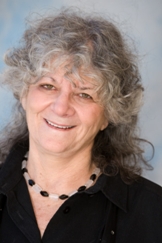Previous speakers and artists
| |
 |
|
March 2-4, 2015
From basic science
to advanced medicine -
Molecules of life and their impact on modern biomedical research
Prof. Ada E. Yonath
|
|
|
Keynote Speaker
Prof. Ada E. Yonath is a 2009 Nobel Laureate for Chemistry at the Weizmann Institute of Science in Israel who has shown what the ribosome - the cell's "protein factory" - looks like, how it functions at the atomic level and how it translates DNA information into proteins, which perform most of life processes.
An understanding of the ribosome's innermost workings is important for a scientific understanding of life. This knowledge can be put to a practical and immediate use: many of today's antibiotics cure various diseases by blocking the function of bacterial ribosomes. Without functional ribosomes cells of all organisms including bacteria cannot survive. This is why ribosomes are such an important target for new antibiotics.
Professor Yonath has generated 3D models that show how different antibiotics bind to the ribosome and how bacteria become resistant to antibiotics. These models have revolutionized the field of structural biology and are now used by scientists in order to develop new antibiotics, directly assisting the saving of lives.
Graduating from the Hebrew University of Jerusalem with a bachelor's degree in chemistry in 1962 and a master's degree in biochemistry in 1964, Ada Yonath earned a Ph.D. in X-Raycrystallography at the Weizmann Institute of Science in 1968. She accepted postdoctoral positions at Carnegie Mellon University (1969) and MIT (1970). While a postdoc at MIT she spent some time in the lab of subsequent 1976 Chemistry Nobel Laureate William N. Lipscomb, Jr., of Harvard University where she was inspired to pursue very large structures.
In 1970 Professor Yonath established the first protein crystallography laboratory in Israel. She was visiting professor at the University of Chicago in 1977-78 and from 1979 to 1984 was a visiting scientist with Heinz-Günter Wittmann at the Max Planck Institute for Molecular Genetics in Berlin. She headed a Max-Planck Research Unit at DESY in Hamburg (1986-2004) in parallel to her research activities at the Weizmann Institute.
In her work Professor Yonath focuses on the mechanisms underlying protein biosynthesis by ribosomal crystallography, a research line she pioneered over twenty years ago despite considerable skepticism of the international scientific community. Ribosomes translate RNA into protein and because they have slightly different structures in microbes, when compared to eukaryotes, such as human cells, they are often a target for antibiotics.
Professor Yonath determined the complete high-resolution structures of both ribosomal subunits and discovered within the otherwise asymmetric ribosome the universal symmetrical region that provides the framework and navigates the process of polypeptide polymerization. Consequently she showed that the ribosome is a ribozyme that places its substrates in stereochemistry suitable for peptide bond formation and for substrate-mediated catalysis. Two decades ago she visualized the path taken by the nascent proteins, namely the ribosomal tunnel and recently revealed the dynamics elements enabling its involvement in elongation arrest, gating, intra-cellular regulation and nascent chain trafficking into their folding space.
Additionally, Professor Yonath elucidated the modes of action of over twenty different antibiotics targeting the ribosome, illuminated mechanisms of drug resistance and synergism, deciphered the structural basis for antibiotic selectivity and showed how it plays a key role in clinical usefulness and therapeutic effectiveness, thus paving the way for structure-based drug design. For enabling ribosomal crystallography Professor Yonath introduced a novel technique, cryo bio-crystallography, which became routine in structural biology and allowed intricate projects otherwise considered formidable.
At the Weizmann Institute Professor Yonath is the incumbent of the Martin S. and Helen Kimmel Professorial Chair. She is the 1st Israeli woman to win the Nobel Prize, the 1st woman from the Middle East to win a Nobel Prize in science and the 1st woman in 45 years to win the Nobel Prize for Chemistry.
SCHEDULE
Monday, March 2, 2015
14:00 Public keynote speech and
dialogue at De La Salle University in Manila (Philippines)
Information and free seat
reservation:
phone (02) 523-4148 and (02) 525-6950, fax (02) 526-1403 and (02) 521-9094,
email rosa.calilung@dlsu.edu.ph
Wednesday, March 4, 2015
09:30 Dialogue with high school
students at Stamford
American International
School in Singapore
(not a public event)
14:00 Public keynote speech and
dialogue at Nanyang
Technological University
in Singapore
Information and free seat reservation:
phone 6592-7589, fax 6795-5360, email ASEAN-Bridges@ntu.edu.sg |
|